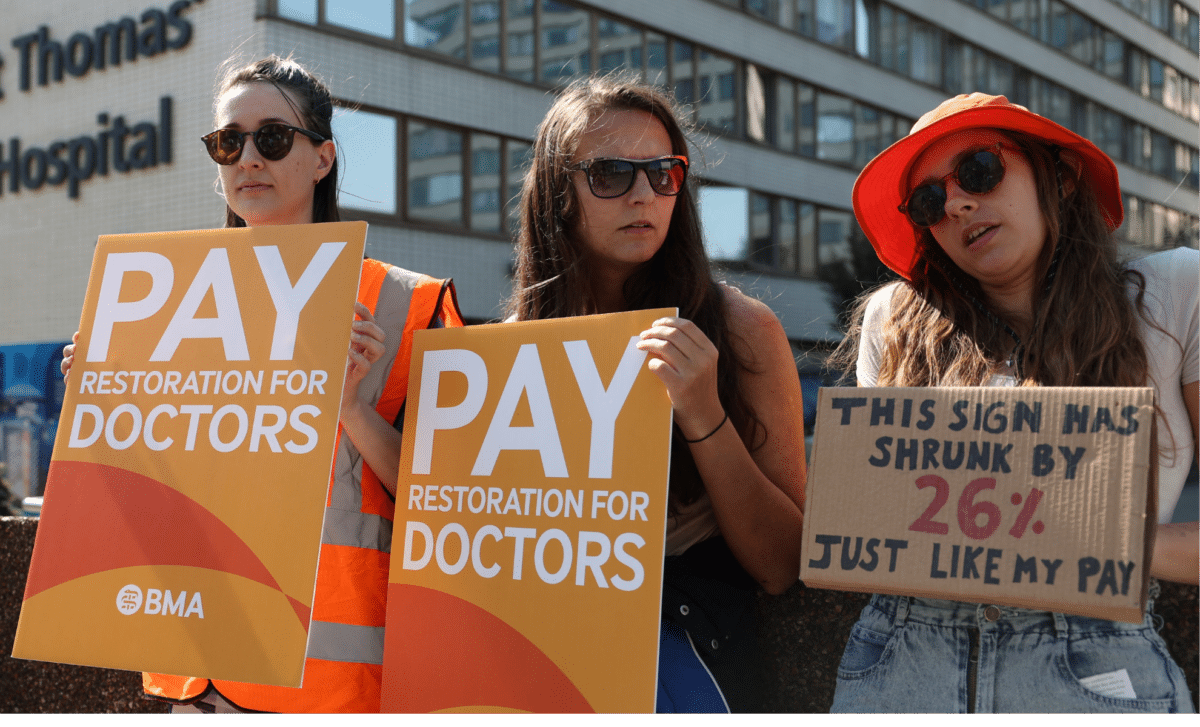In an ongoing salary dispute, junior doctors in England have overwhelmingly opted to carry out six months of further strike action.
Junior Doctors Overwhelmingly Support Extended Strike Action
The Health Secretary was urged by the British Medical Association to take new measures after 98% of its members supported additional strike action.
The new strike mandate, which was passed by the ballot, extends from April 3 to September 19, along with the option to adopt non-strike alternatives.
A year after they started their strike action, more than 34,000 junior doctors cast ballots in the re-ballot, which ended Wednesday at noon. The great majority of them chose to vote in favour of the industrial action.
Dr. Robert Laurenson and Dr. Vivek Trivedi, co-directors of the junior doctors’ committee, stated: “It has now been a year since we began strike action. That is a year of strikes—too many. The government believed it could ignore, delay, and offer excuses long enough that we would simply give up. That attitude has now led to the NHS wasting £3bn covering the strikes.
“This is more than double the cost of settling our whole claim. And as we see in the results of today’s ballot, delaying tactics will not work: doctors are still determined to see their pay cuts reversed, and they are willing to keep striking another six months to achieve that.
“No doctor wants to be on strike for a second longer than they have to. But it took us 15 years of declining pay to get here. Today’s re-ballot shows that doctors understand that reversing this means being in the struggle for the long haul. We ask the health secretary to come forward as soon as possible with a new offer and make sure not a single further strike day need be called.”
BMA Demands a Higher Salary Increase Amidst Stalled Negotiations
It is worth noting that junior doctors went on to strike for five more days in February, building on their six-day walkout in January.
In fact, the British Medical Association has been organising a series of walkouts to demand that doctors’ salaries be reinstated following years of rises that fell short of inflation.
Junior doctors’ salary increases for this fiscal year averaged about 9%; additionally, towards the end of the previous year, discussions were held regarding the possibility of an additional 3% hike.
But no agreement was achieved, and the negotiations came to an end in early December.
The BMA is demanding a 35% salary boost to make up for what it claims are 15 years of pay increases that are less than inflation.
The BMA is rejecting the pay review process for the upcoming year and refusing to present evidence to the independent pay review committee that makes recommendations on pay increases. There haven’t been any official talks since those negotiations ended.
A Department of Health and Social Care spokesperson declared: “It is disappointing that BMA members have once again voted for industrial action, when we have already given junior doctors a pay rise of up to 10.3% this financial year and made clear in previous negotiations that further investment was available.
“Overall NHS waiting lists have decreased for four months in a row, but further strikes will impede this progress, and more than 1.4 million appointments and operations have now been rescheduled since industrial action began.
“We again urge the BMA Junior Doctors’ Committee to demonstrate they have reasonable expectations so we can come back to the negotiating table to find a fair deal that works for the NHS, doctors, and patients.”









